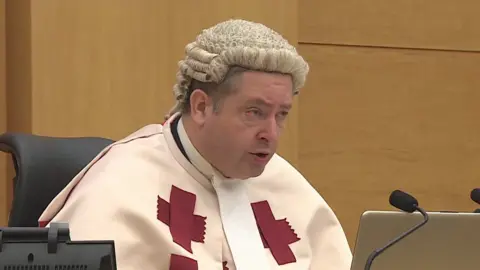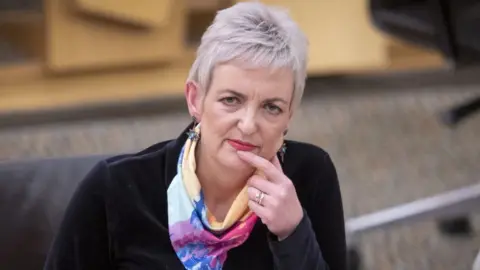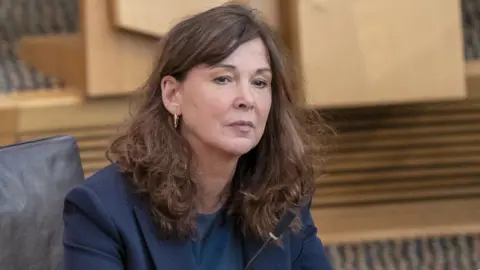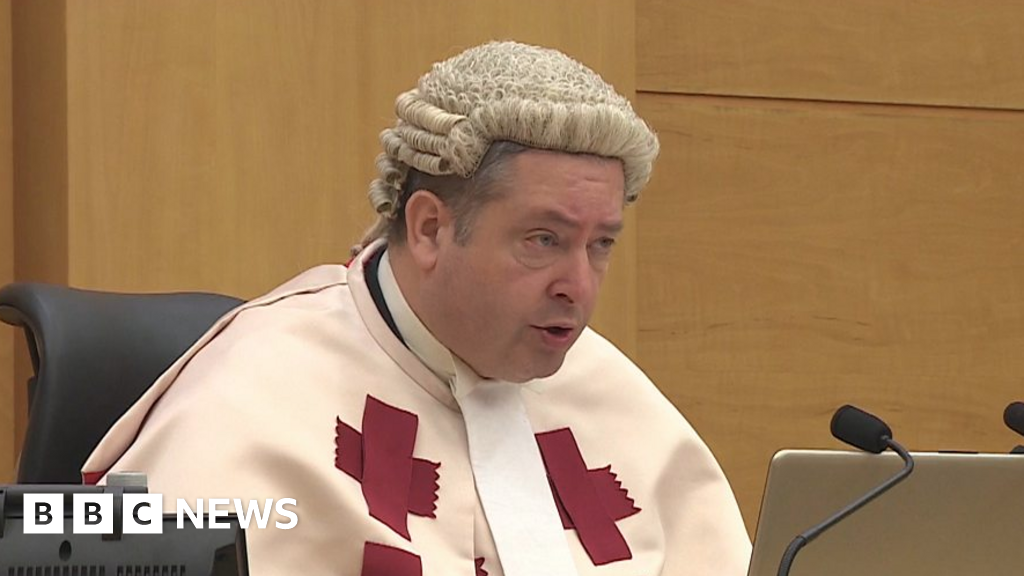 BBC
BBCThe Scottish Parliament is to decide on whether to back reforms to the country’s legal systems, including the removal of the not proven verdict.
The government’s Victims, Witnesses and Justice Reform (Scotland) Bill would also raise the bar for a guilty verdict in criminal trials and pave the way for the creation of a special sexual offences court.
The bill has already been controversial, with ministers dropping plans for juryless rape trials following criticism from lawyers and judges.
MSPs have tabled more than 160 amendments, which will be debated in a late-night session of the parliament on Tuesday.
The debate could extend into Wednesday before a final vote is held.
Although the SNP does not have a majority, the bill is expected to pass with the help of some opposition MSPs.
What is a not proven verdict?
The headline proposal of the reforms is the removal of the not proven verdict – a legal idiosyncrasy that can be traced back to the 17th Century.
In Scots law criminal cases it is one of three possible verdicts, along with guilty and not guilty.
The result of a not proven verdict is exactly the same as a not guilty verdict – the accused is acquitted and is innocent in the eyes of the law.
Some argue that it provides extra protection to the accused. But critics say that it is confusing for juries and the public, can stigmatise an accused person by appearing not to clear them, and fails to provide closure for victims.
A study published in 2019 found removing the not proven verdict might incline more jurors towards a guilty verdict in finely balanced trials. It also highlighted inconsistent views on the meaning of not proven and how it differed from not guilty.
 PA Media
PA MediaOriginally, the government wanted to cut the size of juries in criminal cases from 15 to 12, though this idea has been shelved.
Plans to introduce a two-thirds majority for a guilty verdict have been retained. Currently, a simple majority of at least eight jurors out of 15 is sufficient.
Raising the bar for guilty verdicts is intended to allay the concerns of some defence lawyers who fear the the abolition of the not proven verdict could make it harder to help their clients avoid a conviction.
Prosecutors fear the two-thirds will rule will make it harder to secure a conviction.
The bill also includes proposals to create a sexual offences court and to establish a victims and witnesses commissioner.
Ministers hope that the special court would help prevent complainers in sexual offence cases from being caught up in backlogs, and improve their experience in the justice system by introducing “trauma-informed” training for judges and legal staff.
The commissioner would be in charge of ensuring standards of care for victims and would answerable to parliament.
Ministers are also hoping to ensure:
- An automatic lifelong right to anonymity for victims of sexual offences and certain other offences
- Automatic independent legal representation to complainers in sexual offence cases when defence lawyers want to use evidence relating to their sexual history or character
- That the parole board, when deciding on releasing a prisoner convicted of murder or culpable homicide, considers any refusal to reveal the location of a victim’s body
- That it is easier for vulnerable witnesses to give evidence in civil cases, for example by appearing from video link or from behind a screen.
- the Victim Notification Scheme, which gives victims the right to receive information about the release of an offender from jail, works in a “more trauma-informed and person-centred way”.
What else could the bill change?
There appears to be broad parliamentary agreement over the proposal to scrap the not proven verdict, but opposition parties are calling on the government to go further with their justice reforms.
MSPs have also raised concerns about trying to push through such a wide range of reforms in one bill.
Justice Secretary Angela Constance, who is steering the bill through parliament, has said the reforms will improve protections for victims and witnesses while protecting the rights of the accused.
But Scottish Conservatives leader Russell Findlay has said that without changes, the bill will not “meaningfully change the justice system”, adding: “It’s a victims’ law in name only.”
He is one of several MSPs to have lodged amendments, with Constance backing some of them.
She supports Findlay’s proposal for victims to be informed when plea deals are struck between prosecutors and defence lawyers.
However, ministers have not backed another of Findlay’s amendments calling for the government to set up a grooming gangs inquiry.
 PA Media
PA MediaConstance has said she will support an amendment lodged by Conservative MSP Sharon Dowey which aims to ensure that courts always consider a non-harassment order to protect victims in sexual offence, stalking and intimate images cases.
The justice secretary is also backing a proposal from Liberal Democrat Jamie Greene to create a victims’ charter setting out their rights and what to expect in the justice system.
Ministers have indicated they are open to amendments that would make permanent a trial scheme giving victims of rape and serious sexual assault free access to court transcripts.
And Constance is backing proposals to widen a scheme that allows victims of some offences to make a statement about the impact of the crime to help inform sentencing decisions.
Scottish Greens justice spokesperson Maggie Chapman has tabled an amendment that would mean ministers have to review how courts manage domestic abuse cases where there are connected proceedings.
Ministers are expected to support that, as well as an amendment from Scottish Labour MSP Katy Clark seeking reassurances over measures to improve the experiences of victims and witnesses, particularly women.
 PA Media
PA MediaThe push for reform comes as Lord Advocate Dorothy Bain, Scotland’s top law officer, makes clear her desire to improve the justice system for victims of sexual offences.
Most rape cases reported to police do not lead to prosecutions. Of those that do the conviction rate is significantly lower than for other offences.
For example, in 2022-23, a total of 2,529 rapes and attempted rapes were recorded by Police Scotland. That same year, 372 rape and attempted rape cases reached the courts. The conviction rate was 48%, compared to more than 80% for all crimes.
Last year, after the lord advocate asked judges to consider the issue, they voted to overturn an 87-year-old rule on corroboration in rape and sexual abuse cases.
Judges ruled that distress shown by a complainer at the time of an attack could be used as evidence, making it more likely for cases to reach the required legal threshold to go to court.
One year on, the Scottish legal system could be set for an even bigger shake up.

